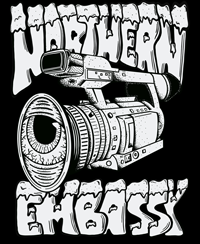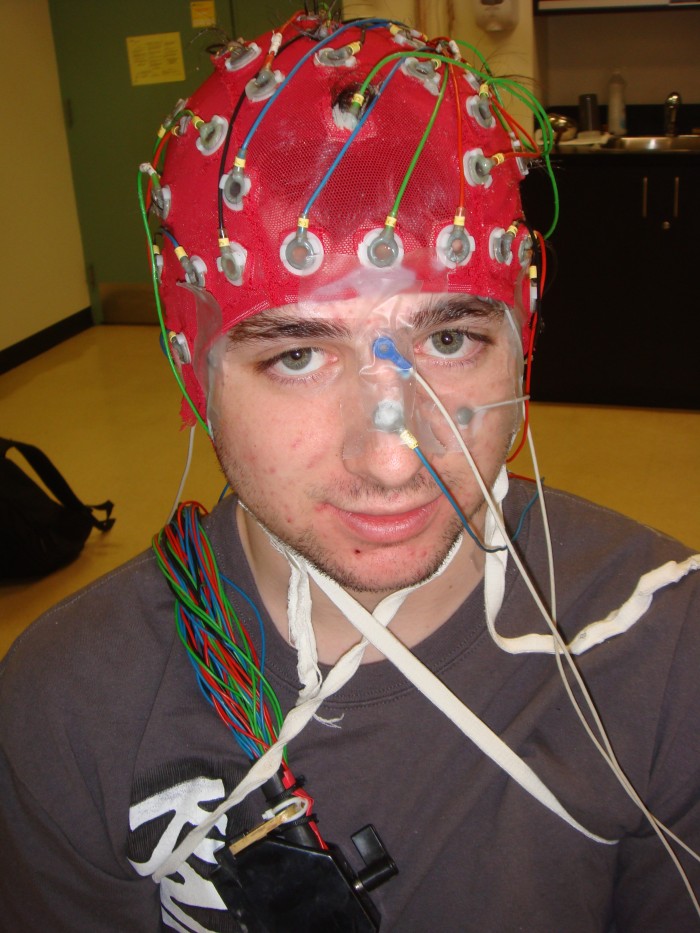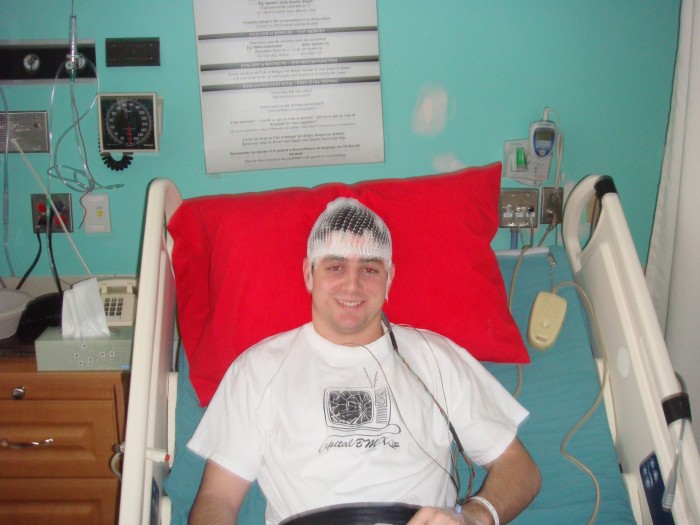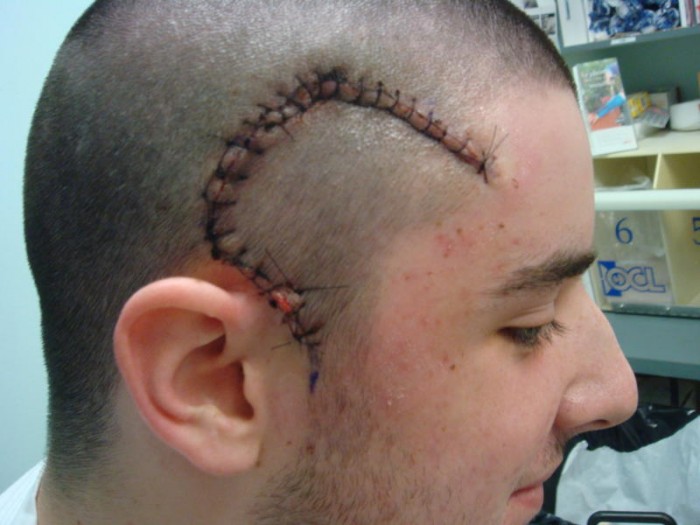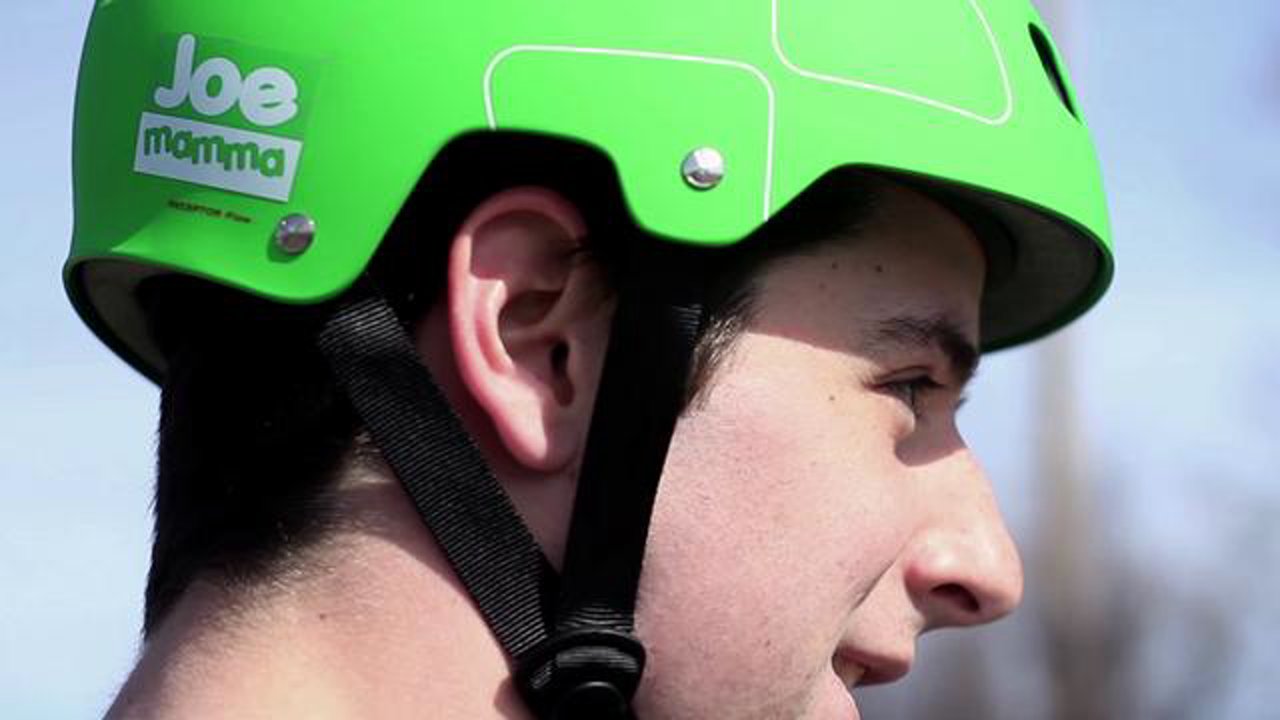
14 Apr Tommy Hains: Head Case
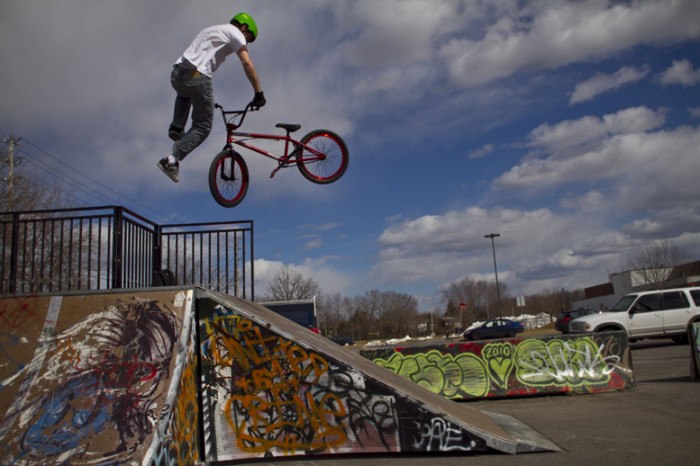
Hip Whip. Photo by Chris Chitaroni.
If you have been riding long enough, chances are high that you have sustained some sort of injury that kept you off your bike for a while. Now what if something kept you off your bike for close to two years, and doctors couldn’t figure out the problem? That was the case for a young Tommy Hains who started to experience seizures suddenly in 2009, which kept him from doing everything that he loved. As a straight A student and gifted young rider, with a number respectable contest placings at amateur contests at the local and national level, he was forced to quit everything in his life as doctors worked to try and explain the seizures he was having and find a way to help him.
Tommy underwent surgery in May of 2010 and has only now been given the OK from doctors to get back in to riding, and from what it seems, it’s as if he never left. I asked Tommy some questions about the ordeal he went through, surgery, how to cope with going stir crazy when you have to give up everything you enjoy doing, and how his life is now. Take a few minutes and keep reading the Tommy Hains interview and check out an edit of his riding that Chris Chitaroni put together.
What first started happening to you that you realized there was a problem, and how long ago was it?
About 4 years ago I started having a lot of déjà-vu feelings during which I would completely zone out from everything going on for about a minute. At that time, I figured it was probably just a vitamin or mineral that was missing in my diet so I didn’t pay much attention to it until that same feeling led to a seizure at school in April 2009. It turns out that the déjà-vu feeling that I was having multiple times per day was an aura which is basically a small seizure that doesn’t reach the rest of the body. Later that summer I had a few more seizures, that’s when my health really started to deteriorate and it became clear that there was something more complicated going on.
What was the final diagnosis the doctors gave you?
The final diagnosis was mesial temporal lobe epilepsy which is a scar or abnormality on my right temporal lobe that was causing the epileptic activity in my brain.
From what I understand, the doctors initially didn’t understand what was happening and wrong with you. Can you explain what went on?
I went through a few tests after my first seizure and nothing was showing up so the doctors figured it was just a freak accident. I brushed it off and kept doing everything normally until I started to feel progressively worse and it became obvious that there was something bigger going on. I had always felt very tired and had a really poor quality of sleep so the doctors thought I might have sleep apnea but the results of my sleep test were normal. I was then prescribed sleeping pills that didn’t help me out much so I moved on to epilepsy medication. That’s when I started a very long process of trial and error that lasted a little over 6 months during which I went through a bunch of different types of epilepsy medication without finding anything that worked. After it became clear that I wasn’t responding well to medication my neurologist referred me to the Montreal Neurological Institute to see epilepsy specialists and look into the possibility of having surgery. After a lot of testing in Montreal, the doctors were able to locate where the seizures were triggered in my brain. My doctors in Montreal were very satisfied with the results of my pre-op tests and apparently I was a ‘‘text book case’’ for epilepsy surgery (they only put the coolest of the cool kids in the books so that says a lot about me).
When did you finally have surgery and what was that experience like?
I ended up having the surgery on May 12th 2010. I was actually looking forward to having it because the sooner it was done the sooner I could get my life back together. The surgery lasted about 5 hours and everything went smoothly. I only stayed at the hospital for 3 nights after the surgery and then came right back home to Ottawa. The surgery itself wasn’t as bad as people might expect when they think of brain surgery. The hospital staff was very helpful and it wasn’t too painful (thanks to lots of pain killers), I was extremely tired. I was very happy about it because I could finally start looking forward to getting better. It was a very positive experience because even though I couldn’t do much, I was still recovering and getting better. I finally felt like I had some power over my health instead of just laying around at home waiting to magically start feeling better. Even though this surgery has a very long recovery period of about 1 year, I focused on enjoying the little things and progressively getting better and better. I started walking around outside a lot and before I knew it I was getting back at school part time and now I’m riding my bike again! I couldn’t have asked for better treatment, my doctors were extremely caring and did a great job making me feel comfortable through the whole process.
What all did you have to give up throughout the whole time? I guess dropping out of school and not being able to drive anywhere are big ones, aside from riding bikes.
I had to give up everything. Things started to get really bad in mid August 2009 right before I was supposed to begin my first year of university. I was very disappointed about having to drop out of school but I didn’t have much of a choice. I stayed at home for almost a year doing absolutely nothing, at one point I even had to calculate how often I would walk up and down the stairs in my house because I would get way too tired. Most of my epileptic activity was at night so I had a really poor quality of sleep and every seizure would drain even more energy out of me. Being tired and sleep deprived is one of the main triggers for seizures so I had to be extremely cautious with the tiny amount of energy I had. Not being able to drive didn’t affect me too much since I wasn’t feeling well enough to get out of the house but it’s starting to be annoying now that I can actually do stuff (I should have my license back in a few months). Not being able to go biking was a pretty big deal because I had never stopped riding for more than a few winter months since I had started biking 6-7 years ago. I sat at home watching a lot of bmx videos and thinking of a bunch of tricks I’d like to do. Another one of the big things I had to give up was being around friends and people in general. I’m a big people person so being isolated at home was a big deal for me.
What was the hardest thing to deal with throughout it all?
I would have to say that the hardest thing to deal with throughout it all was the feeling of being completely powerless during the time that I was at home trying all the different medication with no success. It was very tough to be unable to do anything to help myself get better. I had always been very active so it was hard to be completely isolated and not productive at all. Going through all the testing was also pretty hard to deal with but the doctors and the staff at the Montreal Neurological Hospital were incredible. I need to thank Dr. Kobayashi (neurologist), Dr. Sziklas (neuropsychologist) and of course Dr. Hall (neurosurgeon) for being extremely caring and helping me deal with the whole process. I also have to thank my parents and family for staying by my side to help me get through the toughest times I’ve had to face in my life.
What did you do with all the time on your hands to keep from going crazy?
I bought an Xbox to try and entertain myself but getting constantly murdered on Call of Duty became frustrating pretty quick. I was really burnt out most of the time so I just watched really boring daytime TV and took a nap every afternoon. My brother was actually working from home for a few months so he tried to entertain me and definitely helped to keep me from going completely crazy. After giving up on daytime TV I started to watch all the seasons of a bunch of TV series like Weeds, Entourage, Californication, Parks & Recreation, Hung, Misfits, South Park and everything else I could get my hands on. I started walking around my neighbourhood a lot once the surgery was done and I started to get better. Going outside to get that little bit of exercise and fresh air made a big difference and really encouraged me for the recovery.
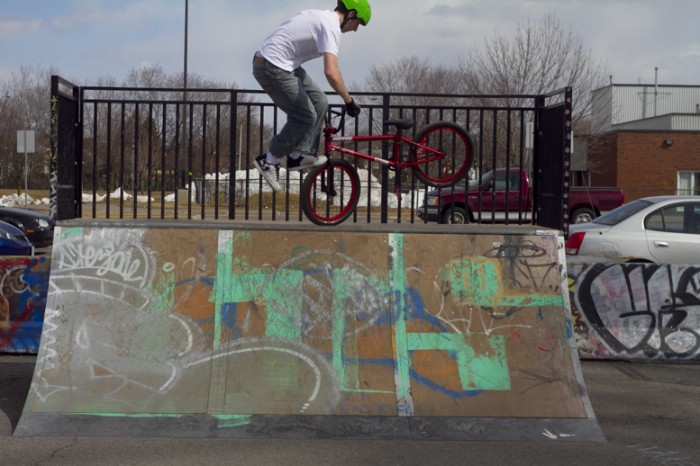
Footjam Whip. Photo by Chris Chitaroni.
After the whole experience is over now, what can you say you’ve learned from it all, if anything?
This whole experience has proven to me how fragile life can be; it can all change in a flash. Before you know it things that used to be a part of everyday life can seem like a luxury that always stays outside your reach. The wonderful thing is that it can also work the other way around. When it feels like you’re completely out of luck something can come and bring your whole life back together which I am extremely happy to be experiencing. I have learned to appreciate all the little things, I now notice how lucky I am to be able to choose what I want to do and to pursue it.
What are you most excited to get back to in your life now that it’s all over? Are there any things that you plan to change in your life?
The thing I am the most excited to get back into my life is definitely being able to ride. It’s been such a huge part in my life since I started so it feels incredible to finally be back at it. Biking also means I get to hang out with a bunch of friends that I barely see if I’m not riding which makes it even more exciting. I’ve always been the type to get stressed and worry about little things that aren’t too important. I’m making an effort to change that by remembering what I’ve been through to remind myself that I should be enjoying everything, even the little problems that come along once in a while.
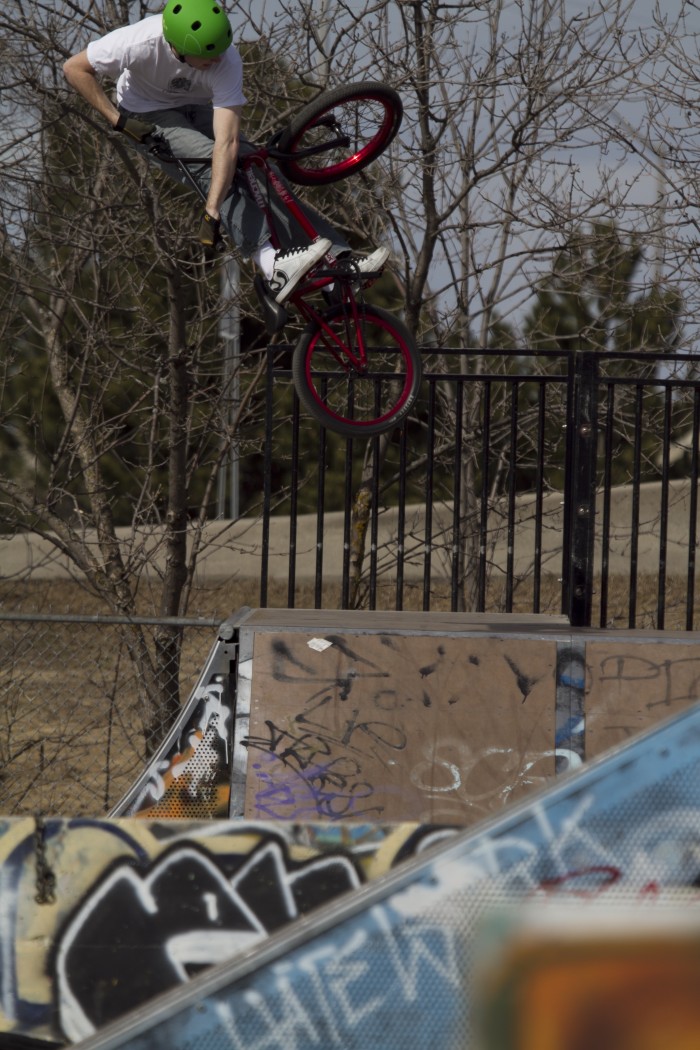
Clicked Turndown. Photo by Chris Chitaroni.
From the photos and what people have told me, it sounds like your riding is better than it has ever been and unaffected by two years off your bike. Do you have any upcoming plans or goals, and what’s next in the life of Tommy Hains?
It’s flattering that some people have been saying that but they lie; my riding is definitely not better than it used to be. There are a bunch of tricks I used to do that I haven’t been able to figure out yet or that I have just been way too scared to try. I’m still very surprised and excited about how much I’m able to do considering how long it’s been. The plan now is to do a lot of riding, I want to make an effort to go ride in Toronto, Montreal and all the parks around Ottawa. There are also plans in the works for a Vancouver trip. The next step in my life will be to complete my recovery, ride my bike, have fun with friends and family and go back to school full-time. My only goal for this summer is to enjoy life and have a blast on and off the bike.
Filmed and edited by Chris Chitaroni.
